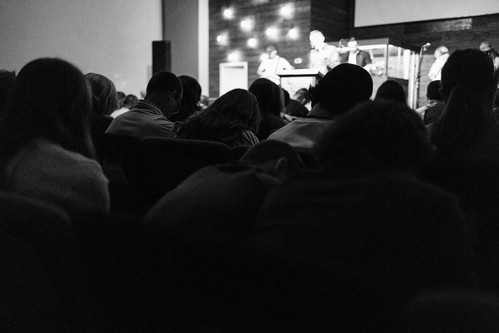April 17th, 2023
by John Rogers
by John Rogers
Job and Genesis
by Sarah Jones

I used to believe my depression and any suffering I endured in life was due to a sin I committed. I actually read the book of Job my senior year after enduring my first heartbreak and spent 31 chapters agreeing with everything Job’s friends said to him. Even though the book began with God exalting his servant and praising his obedience, I still decided in my brain that Job had to have done something to incite God’s wrath. There was no nuance. There was only sin and its consequences.
The growing popularity of the prosperity gospel mixed with sinful humans’ understanding of consequences and judgment influenced my young mind and heart to believe lies about God that were never true. I related all too well to Job in his anger, and I related all too well to his friends on their opinions of God and His judgment and grace.
Grace was not a word I ever used in my vocabulary at that time in my life. I didn’t believe in it for myself or for other people. It was not until I began to understand the theology behind Genesis 1-3 that I could truly begin to nuance passages like Job 21. I can objectively see Job in his anger against God and confusion on why he is in deep suffering. Job has not sinned. God said that himself in the beginning of the book. Job is not being punished. So when he asks questions like “Why do the wicked continue to live, growing old and becoming powerful?” in 21:7, I see a man who is asking the right questions.
Job is pushing back against his friend’s theology, and in doing so he pushes back against ours. If God punishes the wicked like you say that I am, then why are the wicked being blessed? Job is saying, "Your theology does not hold up; I don’t know why I am suffering; I am upset about my suffering, but I know that I did not cause my suffering.
He proves this in 21:16 when he says of the wicked that “their prosperity is not of their own doing.” They did nothing to cause their own prosperity just like Job did not cause his own suffering. All things are in the hands of God.
God created a perfect world in Genesis 1 and 2. All things were good, and humans were very good. The intention of creation was to serve the Lord, work the land, and prosper. But in Genesis 3 the world broke when sin entered. The direct line to prosperity was broken, and the way we perceive fairness and justice could no longer be black-and-white. When the world was created, humans were prosperous because they were in communion with God and without sin. There was no broken world to cast its brokenness on them. There was only the presence of God. Then sin entered and humanity was broken along with the world. As a result, good things happen to bad people and bad things happen to good people. Yet we know God does not view people through such a simple lens.
There is more to His justice and prosperity than we will ever be able to conceive. What we do know is that he restores our blessing and prosperity through Christ alone, so that even in the midst of suffering in a broken world we are one with Christ. Our hope is in him and the full future restoration He will bring. He promised us hard times of suffering and persecution, but he also promises us Himself in the end. Our vindication is near!
The growing popularity of the prosperity gospel mixed with sinful humans’ understanding of consequences and judgment influenced my young mind and heart to believe lies about God that were never true. I related all too well to Job in his anger, and I related all too well to his friends on their opinions of God and His judgment and grace.
Grace was not a word I ever used in my vocabulary at that time in my life. I didn’t believe in it for myself or for other people. It was not until I began to understand the theology behind Genesis 1-3 that I could truly begin to nuance passages like Job 21. I can objectively see Job in his anger against God and confusion on why he is in deep suffering. Job has not sinned. God said that himself in the beginning of the book. Job is not being punished. So when he asks questions like “Why do the wicked continue to live, growing old and becoming powerful?” in 21:7, I see a man who is asking the right questions.
Job is pushing back against his friend’s theology, and in doing so he pushes back against ours. If God punishes the wicked like you say that I am, then why are the wicked being blessed? Job is saying, "Your theology does not hold up; I don’t know why I am suffering; I am upset about my suffering, but I know that I did not cause my suffering.
He proves this in 21:16 when he says of the wicked that “their prosperity is not of their own doing.” They did nothing to cause their own prosperity just like Job did not cause his own suffering. All things are in the hands of God.
God created a perfect world in Genesis 1 and 2. All things were good, and humans were very good. The intention of creation was to serve the Lord, work the land, and prosper. But in Genesis 3 the world broke when sin entered. The direct line to prosperity was broken, and the way we perceive fairness and justice could no longer be black-and-white. When the world was created, humans were prosperous because they were in communion with God and without sin. There was no broken world to cast its brokenness on them. There was only the presence of God. Then sin entered and humanity was broken along with the world. As a result, good things happen to bad people and bad things happen to good people. Yet we know God does not view people through such a simple lens.
There is more to His justice and prosperity than we will ever be able to conceive. What we do know is that he restores our blessing and prosperity through Christ alone, so that even in the midst of suffering in a broken world we are one with Christ. Our hope is in him and the full future restoration He will bring. He promised us hard times of suffering and persecution, but he also promises us Himself in the end. Our vindication is near!

More from the blog:
Finding the Right Foundation for Your Life
February 16th, 2026
Sojourners in the Flesh
February 9th, 2026
Suffering is Not Pointless
February 2nd, 2026
Romans and Ratatouille
January 26th, 2026
A Taming of the Shrewd
January 19th, 2026
Commit Fully
January 12th, 2026
Keeping our Brothers
January 5th, 2026
Read the Bible in 2026
December 29th, 2025
A Challenge for Parents this Christmas
December 22nd, 2025
No One Can Snatch Me Out of My Father's Hand
December 15th, 2025
Recent
Archive
2026
2025
February
March
April
September
October
November
2024
March
April
September
October
2023
April
May
July
August



No Comments